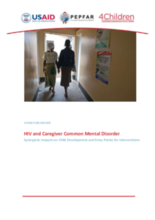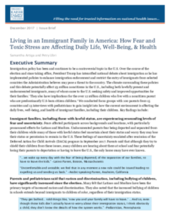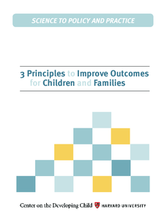Displaying 241 - 250 of 496
In this paper, the authors review published literature on the mental health status of mothers living with HIV (MLH) and how this affects their children; outline the pathways between maternal HIV, maternal mental health problems, and negative child outcomes; and then describe a number of intervention entry points that they argue have the potential to enhance impact across PEPFAR platforms.
This video from Catholic Relief Services provides an overview of the Thrive II project, a program designed to enhance parent-child bonds and strengthen early child development.
The authors of this study conducted focus groups with 100 parents from 15 countries and 13 interviews with pediatricians to gain insight into how the current political environment in the United States is affecting the daily lives, well-being, and health of immigrant families, including their children.
In this study, 30 primary school aged UK adoptees without a history of institutionalisation completed an assessment of their intellectual, executive functioning and social communication abilities.
This study examined facial emotion recognition in 12-year-olds in a longitudinally followed sample of children with and without exposure to early life psychosocial deprivation (institutional care).
This chapter describes the contemporary situation of children in sub-Saharan Africa with successive foci on child growth, the home environment, parenting, and discipline using data from the Multiple Indicator Cluster Survey (MICS).
This webinar, from the U.S. National Child Traumatic Stress Network, as part of its Childhood Traumatic Grief e-learning series, describes the impact of traumatic separation, attachment, and attachment disruption on children and adolescents.
This Handbook explores early childhood interventions and policy through 36 chapters in various country contexts, including chapters on early childhood services for children in care.
This study examined the extent to which maltreatment history and the characteristics of out-of-home care correlated with the language and social skills of maltreated children.
This report from the the Center on the Developing Child at Harvard University in the United States argues that, to be maximally effective, policies and services should: (1) Support responsive relationships for children and adults, (2) Strengthen core life skills, and (3) Reduce sources of stress in the lives of children and families.



